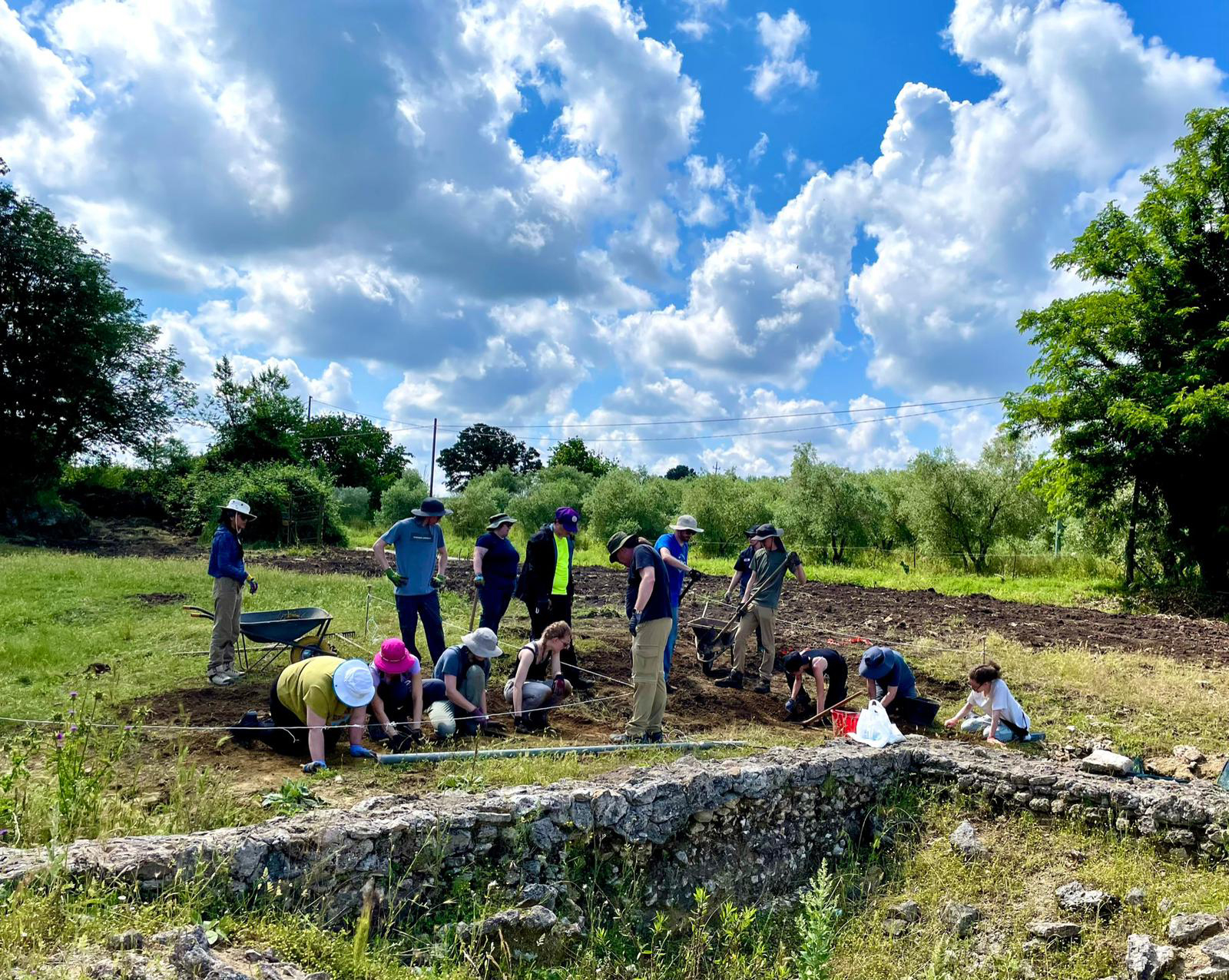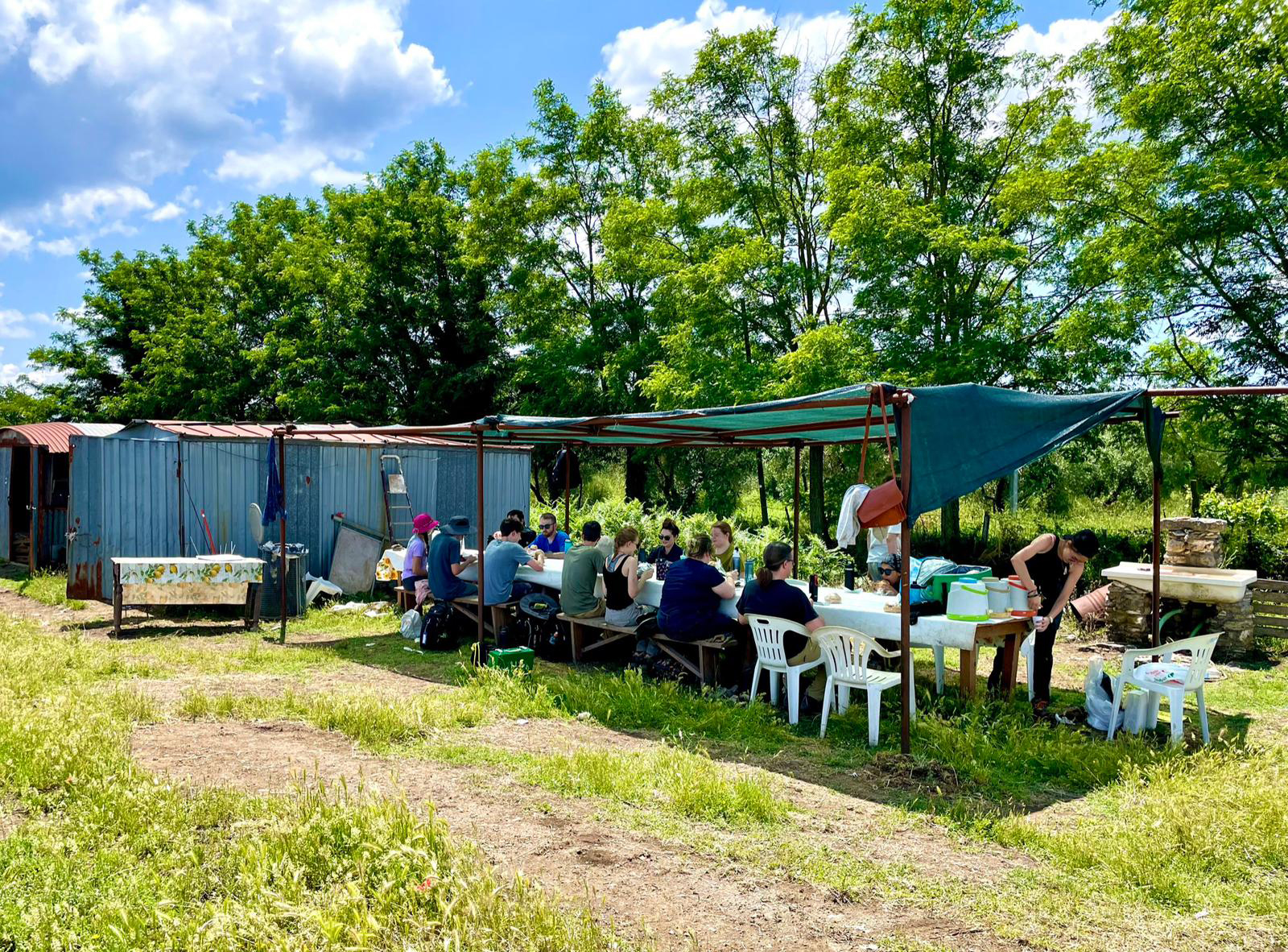(Editor's note: The end of this post seems like the opportune time to revisit the 2017 WCC study abroad group making international news for helping to unearth 2,000-year-old Roman writing tablets in Vindolanda >> washtenaw.cc/Vindolanda)

Now that we are at the dig site and have our long days in the Italian dirt, every morning we load into a small van (needing two trips for all of us) and drive through the Italian countryside. While being in the countryside every morning, we watch the sheep pass between farmers' fields. They are led by sheep dogs, and one does like to come greet us. He even joins us for lunch to just hang out.
The first morning, we pulled out tools to help clear the weeds for the site. It was hard work but it is what we are here for, to help the ‘Gruppi Archeologici D’Italia’ with not only our dig, but the digs for the rest of the summer. We then mapped out the sites for our dig, which is 5x5 meter squares, and got to use our math skills to make sure they were square and even. Our day was cut short with some rain, but it was a good first day. We were told this weeding was going to be the hardest day, but we beg to differ.
Our next day started with what is called ‘chunking it out,’ or leveling the units. This means we have to remove all the top soil that was impacted by the farmland to get down to the Roman Culture Layer. This was much more straining than the weeding. We were hauling wheelbarrows of dirt all day. It was a bit difficult to get instructions due to Gianfranco (the head archeologist) not speaking any English. With the help of Margarita (an archeology student here in Italy), we were able to get the instructions and get to digging. One of the units was well situated on a hill, so much more dirt to move. The other unit was much more flat. So, by the end of the day we had most of the unit topsoil removed but not level yet.

On the second true day of excavation, we kept chunking it out. We did find some cool things, but it was not much different in work than the previous day. The third day is when both of the groups got to leveling the units out so we were uncovering some interesting things in the soil. Both units have some plow lines running through them, but one has some compacted dirt that Gianfranco says looks like possible Bronze Age tombs that have been found in other places on the site.
Even though we have not done any true excavation, we did find a bunch of ceramics, a Roman nail, and some animal bone. So at the end of the day, after piling into the van, we got back to our hostel (which is an old mill), got some buckets of water and scrubbed our discoveries so we could see their true beauty. It is wild to hold things that we found that are from Romans times.
As much fun as the digging is, we are also getting used to now being in a much smaller town then where we have been in Rome and Naples. Instead of relying on pubic transportation, we are walking when we need anything. We have started a nightly tradition (except when the place is randomly closed) of walking to the café where we can get gelato.
The one major thing that has shocked us is how cheap most things are. Our nightly gelato run is only €2 for a small, and €2.50 for a medium. It is delicious, so we don’t think it will stop anytime soon. The only downside of the small town is that there is more of a language barrier here. While in Rome and Naples most people could speak a little English so we could communicate, here in Ischia Di Castro most of the townsfolk we interact with do not speak any English, but we have been able to find ways to communicate.

The hostel we are staying at does have its pros and cons. Us all being together to bond as a group is great, but tight space might cause some tensions in the future. The food here has been fantastic and arguably better than the food we have had previously from restaurants. Although we had been dealing with the freezing cold showers due to the water heater being broken, we all took quick cold showers. They did fix this issue in the first few days, which makes showers much more bearable. With the tight living situations and lack of privacy, we cannot imagine later this summer when they will have double the people in the same space.
We cannot wait to dig more out of the ground, as this is what we came to do. We hope to make interesting discoveries. Some are joking about us finding the Holy Grail and Ark of the Covenant . While we probably won’t find these things, we can’t wait to keep getting our hands dirty and hope to find great things. The units that we have are looking like they might hold some interesting artifacts, and we cannot wait until we can uncover them.
-----
Tags: Study Abroad
